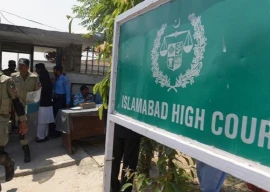
PPO was approved by President Mamnoon Hussain on October 20, 2013 and passed in the National Assembly on April 7, 2014 but it still requires Senate approval. The ordinance grants sweeping powers of arrest and detention to security forces.
According to a press release, the rights body called on the Senate to refuse to approve the “repressive law” and return it to the National Assembly with needed revisions.
Asia director at Human Rights Watch Brad Adams said the anti-terror laws shouldn’t be used to undermine fundamental rights. “The Protection of Pakistan Ordinance as drafted runs roughshod over rights provided under international law as well as Pakistan’s constitution.”
He urged that denying Pakistanis their universal rights and freedoms isn’t a smart or effective tool for battling terrorism. “The government should step back and fully revise the Protection of Pakistan Ordinance with input from civil society and international experts to instead craft a law that addresses serious crimes while protecting rights,” Adams said in the press release.
If Senate rejects the bill
Under the rules if a piece of legislation is cleared by the lower house and rejected by the upper house, the Senate has to give reasons for its rejection. The bill will be referred back to the National Assembly, which will have either to rectify the bill by amending the contentious clauses and re-pass it, or it will call a joint session of the two houses, where the head count is done on combined strength.
With some seats vacant in the 342-member house, the ruling PML-N has 190 members in it and 16 in the Senate. Thus it can have a maximum combined strength of 206 members of its own in the two houses. It will still need backing of other parties to secure simple majority-over 50% votes to get the law passed in a joint session. Currently, the NA has 339 members and the Senate has 103 members.
COMMENTS (10)
Comments are moderated and generally will be posted if they are on-topic and not abusive.
For more information, please see our Comments FAQ
























1715142871-0/imfsalary-(1)1715142871-0-270x192.webp)










Let me copy-paste a section of the ordinance that contains the list of 'scheduled offences', i.e. a list of acts that can get you shot and killed: Section 2 (xiv) on page 9/9:
crimes against computers including cyber crimes, internet offenses and other offences related to information technology etc;
which means anybody that pirated even a single mp3 once in their lives, under this legal language are committing a 'scheduled offence'.
Also killing and kidnapping of foreign visitors and tourists is an offence, (Section 2(v)) but no additional legal security for normal Pakistani nationals. Typical attitude of a slave-nation. Shame on us.
Pakistan needs security, Human watch dogs should go to US and raise voice over Guantanomo bay prisons and water boarding punishments.
@baloch: they are ethnic groups not nation if you are really Baloch though i highly doubt. You are working on the agenda to malign Pakistan, can't you just keep yourself to Indian papers, Keep your concern to North eastern states injustices to Tamil injustices Red corridors
Oppressed nations in Pakistan like Sindhi and Baloch are now raising voice against the Punjabi hegemony , this law is basically to shun those voices. It's Punjab protection ordinance actually.
ET , please do not censor my comments.
The bug of human rights is the biggest obstacle in fighting terror. Any one ever asks what about the human rights of the innocent civilian women, children and men killed by these terrorists. What about the rights of those policemen and soldiers who lay their lives in protection of civilians or the country. So stop the 'natanki' of human rights of terrorists they have non as they do not follow any civil code.
Human Right Watch becoming a dictatorial organization..hardly any view about the poor muslims of Palestine,Kashmir & Afghans who die everyday without any reason.
we should keep that thing in mind that we are in a state of War! There is insurgency in almost every single cornor of this Country and hundred of thousands lost their lives in thus turmoil and and within this week more then 50 perished aross country in different terrorist attacks! So how can these organisation claim that PPO will suppress basic Human Rights??? Where already human rights are on the misery of terrorism! I think we are already facing worst so nothing goinh to be more worst! Let it be amalgamated because we need severe actions against terrorists which already deprived the peoples of Pakistan from their basic rights of living!
Pakistan lacks proper reporting for prevention of crimes. The government must be available to sort maladies before coming up with laws that fringes on basic citizen rights given in constitution. At police stations or with various governmental interrogation rights of citizen must be read as well as recourse to family and lawyers. We need to prevent so many going to court over little matters by documenting and simplifying land records, basic observance of civility by government officers as well doing the required work We can reduce the malady of corruption and increase citizen respect. On simple taxation like Professional Tax it should be just deposited with a general receipt no need for government employee to visit premises. Health authority must have proper recruits as well Food inspection and facility ratings. Surely we must reorganize these organizations by simplifying laws and not a Horrendous Punishing or Penalties imposition that Business begging before officers. Loosing dignity is greater crime.